· Good Morning – Community Services and the Prevention Alliance is looking for a graphic designer and/or website designer to create a logo and internet presence for the coalition. The Prevention Alliance’s mission to promote mental health and reduce substance abuse in the greater community. They are a committed group with a big vision and would greatly appreciate your time and talent. Please call Heather at (571) 641-7019 or via email at: [email protected] to learn more.
· Youth for Tomorrow is looking for volunteers to share hobbies and interests with the kids on weekends. If you have a little time please bring your interest to share with them such as sewing, gardening, cooking, golf, arts & crafts, jewelry to name just a few. Please fill out the volunteer application with your resume at: youthfortomorrow.org.
· The Live Well Festival needs volunteers on Saturday April 21st. for a number of fun positions including directional assistants in the morning, helping folks drop off to the shredding truck for the morning or afternoon shift and assisting the cooking demos that also have a morning or afternoon shift. Please email Melissa at:[email protected] to learn more.
This article is FREE to read. Please Sign In or Create a FREE Account. Thank you.
 You see their faces as you drive through a busy stretch of Northern Virginia highway- knowledgeable women, skilled, well-versed and educated in their fields: Women Physicians For Women’s Health.
You see their faces as you drive through a busy stretch of Northern Virginia highway- knowledgeable women, skilled, well-versed and educated in their fields: Women Physicians For Women’s Health.
Their billboard sits off of Route 1 in Prince William County, not far from Dawson Beach Road, and less than five miles from Sentara Northern Virginia Medical Center.
We had a chance to interview these physicians, learn more about what drives them, and have them share their experiences.
Dr. Christina Baraty, MD, Attending Physician, Obstetrics and Gynecology
Q: What is your specialty and what do you love about it?
“My specialty entails all aspects of women’s health. I manage well-woman exams, birth control, gynecologic complications, infertility, pregnancy, menopause, and more! I am also a surgeon and I am able to manage any gynecologic or obstetric issues with surgical management. I love being a part of a woman’s lifelong health and an advocate for women. I love that gynecologists were at the forefront for minimally invasive surgical techniques starting with laparoscopy and now today with DaVinci Robotic surgeries. I love that we are strongly trained in using ultrasound imaging in OB/GYN to quickly, easily, and safely image patients in the office or at the hospital with a portable ultrasound if necessary for a diagnosis.”
Q: You’re new to the Woodbridge market- what are you excited about, moving forward?
“I’m really excited to be coming from an academic center and applying evidence-based medicine to local community hospital here in Woodbridge.”
Q: What do you wish patients knew or asked going into/coming out of care?
“I love my patients that play a role in their own health care, ask questions, and are engaged in their healthcare conversation. They can do this by having a patient portal account with our office that easily allows them to review their own results and electronically message me with any questions or concerns.
Dr. Ghana Kang, M.D, Hematology Oncology
Q: What is your specialty and what do you love about it?
“My specialty is treating patients with blood disorders or cancers. I like it for several reasons, it is scientifically challenging but exciting!!! There are many new potential armamentariums in the pipelines. Major multinational pharmaceutical companies are investing to develop new cancer drugs. Having a new FDA-approved indication almost every day is fascinating. Also, people may think cancer is a death sentence. However, a lot of patients actually go cancer-free or LIVE with cancer. And I walk the long journey with them, side-by-side, through victorious, as well as sad moments.”
Q: You’re new to the Woodbridge market- what are you excited about, moving forward?
“Contributing to the community and helping people in need.”
Q: What do you wish patients knew or asked going into/coming out of care?
“Cancer treatment is constantly evolving. Your treatment will likely be different from that of your acquaintance. Don’t be overly discouraged from all you hear. Consult with trustworthy specialists.”
Q: What do you want patients to know about you?
“I delicately consider all the treatment options for each of my patients. When they suffer, I suffer as well.”
Dr. Alexandra Modiri, MD, Gastroenterology/Hepatology
Q: What is your specialty and what do you love about it?
“My specialty encompasses disorders of the GI tract, including the pancreas and liver. My specialty provides me with a variety of things to do in my day to day practice. I am never bored! I enjoy seeing patients in clinic, getting to know them and helping them with their issues. My specialty also allows me to perform hands-on procedures such as endoscopy and colonoscopy- which are things that I enjoy.”
Q: You’re new to the Woodbridge market- what are you excited about, moving forward?
“I am excited to get to meet and know the people in my community and grow my practice as I set new roots.”
Q: What do you wish patients knew or asked going into/coming out of care?
“Colonoscopies saves lives. Having a colonoscopy is not as bad as it sounds/seems.”
Q: What do you want patients to know about you?
“I am a compassionate and caring physician. When patients come to see me, their health is my number one priority and I will do my best to help them.”
Good Morning – Comcast Cares Day is Saturday, April 21 from 7:30am-1pm at the Georgetown South Community in Manassas. This wonderful partnership with Leadership Prince William brings together hundreds of volunteers to do supper stuff throughout the community. Grab your friends, family and colleagues to join in the fun. Tasks for the day include mulching 45 playgrounds, planting the community garden and window boxes, painting and personalizing 30 picnic tables in the green space but most importantly putting house numbers on the rear of all 840 homes in the community for added security and safety. Please register online at: leadershipprincewilliam.org/event/Comcast-cares-day or by calling the Community Center at: 703-361-4500. It doesn’t get any easier to accomplish so much more.
- Saved Hands Foundation has the perfect excuse not to cook lunch or dinner on Thursday April 19th. Come join them at Bobby’s Burger Palace at Potomac Mills for fun and food to support their wonderful work. All the proceeds of this event will enable them to purchase school supplies for the Back Pack giveaway to needy children next school year. Please tell them you’re coming at: groupraise.com/events/57276 by April 16th.
- Virginia Cooperative Extension is having their next volunteer training starting May 9th. Come share your knowledge and gain new tips to help families get back on their feet. Please register at: pwcgov.org/money. Or you can call Victoria at (703) 792-4799 to learn more.
- Volunteers needed on April 21st for the 9th Annual Upper Occoquan River Clean-up – 9am-2pm. This extensive project has a whole number of places to start the day. Trash bags, water, gloves and refreshments provided. Please visit their website at: pwtsc.org to register and get all the specifics for the day. Please email Ed at [email protected] to learn more.
- ACTS in Dumfries needs handy volunteers to help with sprucing up and maintaining the facilities on either Tuesdays or Thursdays. They also need admin help at the front office during traditional business hours. Come join the great folks at ACTS by filling out the volunteer registration form on the website: actspwc.org or email Tamika at: [email protected] to learn more.
- Youth for Tomorrow is looking for volunteers to share hobbies and interests with the kids on weekends. If you have a little time please bring your interest to share with them such as sewing, gardening, cooking, golf, arts & crafts, jewelry to name just a few. Please fill out the volunteer application with your resume at: youthfortomorrow.org.
- Project Mend A House is gearing up for their Spring Gala and need 25 volunteers to assist before and during the event on Saturday April 25th. The 2018 Art, Wine and All That Jazz Celebrity Awards Gala promises to be fantastic with Dionne Warwick and Jerry Mathers who we of a certain age remember him as that darling “The Beaver” character. There will be a VIP Reception and Celebrity Meet and Greet before the gala, silent auction and desert reception. Musicians Marcus Johnson, Caleb Green and Kevin Sasaki as well as artist John Joseph Holohan III will be featured. Please call Gina at (703) 792-7663 to register for this fun volunteer opportunity.
- Care Net is having their Run 4 Hope. Walk for Life 5K fun run and 1 Mile walk on Saturday April 14th beginning at 8:30 am at the Harris Pavilion in Manassas. It’s a fun way to start your weekend. On line registration is just $15 and at the door is $20. Free T-shirt and wristband with registration. Kids 12 and under are free. Please register at: voice4life.org or email them at: [email protected] for more info.
- Keep Prince William Beautiful has a fun new program for fitness enthusiasts to take action to be environmental stewards. This volunteer team is called Prince William Ploggers. Please call Lynda at (571) 285-3772 to get your Plogger team going.
- The Autism Society of Northern VA is gearing up for the annual walk in the fall and need volunteers to join their planning committee. Tasks include coordination, outreach, recruitment, promotion, fundraising and logistics management. Please email them at: [email protected] to learn more.
- Manassas Parks, Culture and Recreation is looking for volunteers to serve as instructors or assistants for a basic tech class for seniors. The curriculum includes navigating the internet, online banking, reading emails and attachments as well as basics of Microsoft Word. Please call Jean at (703) 257-8451 to learn more.
- The ARC Greater Prince William invites you and your family to their 5K Run/Walk/Roll on Saturday April 28th, 8am at Potomac Nationals Stadium. $25 for the first 100 participants, $30 early-bird registration before April 1st and then $40 regular price. Please visit arcgpw.org for more info and to register today!
- Mark your calendars for April 18th at Chick-Fil-A in Lake Ridge to find more volunteer opportunities from area agencies. The event is 9am-10:30am. Bring your friends for free coffee.
- The Bull Run Rotary Club invites you to their annual Manassas Runway 10K, 5Kor 1 mile run on the Manassas Airport Runway on Sunday April 29th at 8am. Please register online at: bishopseventregistrations.com
If you are looking for other opportunities, please don’t forget to call my wonderful team at Volunteer Prince William. Jan can help you with the Retired and Senior Volunteer (RSVP) opportunities at (703) 369-5292 ext. 1, Shelley can help with any individual or group projects and send you weekly updates if you’d like. Shelley is at (703) 369-5292 ext. 2, and Bonnie can help you with opportunities available in Disaster Preparedness at (703) 369-5292 ext. 3. Please visit our newly re-vamped website at www.volunteerprincewilliam.org. Thanks so much for all you do in our community.
Call to Action is a column written by Volunteer Prince William Director Mary Foley.
Here’s a term you might not be familiar with — the sandwich generation. It typically refers to the generation that cares for both children and aging parents.
Traditionally, the generation is made up of people in their thirties and forties. But with technology, advanced healthcare and a wide span of years during which parents decide to have children, the sandwich generation can include people in their twenties and fifties, maybe even sixties, in some cases. The Pew Research Center says, “Who is the sandwich generation? Its members are mostly middle-aged: 71% of this group is ages 40 to 59. An additional 19% are younger than 40 and 10% are age 60 or older.”
No matter what age you are, though, there is no doubt that sandwich generation caregivers experience some significant challenges.
Time is not on our side
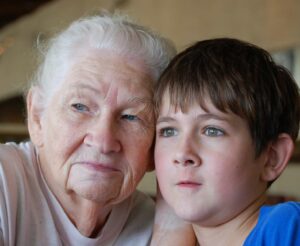 There are only so many hours in the day, and so many days in the week. Even if you break that down into minutes, sandwich generation caregivers might still find themselves operating at a deficit. The senior parent in your life might need to see a specialist with limited availability twenty minutes before your youngest is due to play the final game of the baseball season.
There are only so many hours in the day, and so many days in the week. Even if you break that down into minutes, sandwich generation caregivers might still find themselves operating at a deficit. The senior parent in your life might need to see a specialist with limited availability twenty minutes before your youngest is due to play the final game of the baseball season.
Both need rides, both need to be there on time or earlier, and both want you to be there with them. You can’t reschedule either activity, and your spouse is slated to be out of town for the week. Yes, you can probably find a ride for your baseball star, but you don’t know how your mother will feel after her appointment or how long the appointment will take, so you may not be able to make the game, even late.
Sometimes, even though you’ve planned better than an agent undertaking mission impossible, the situation is still very much impossible. You can’t be in two places at the same time, at least at this point in human evolution.
Money is finite
If you’ve ever been in the position of standing in the checkout line only to realize you didn’t have enough in the bank to cover the purchase and you weren’t sure whether you’d reached your credit limit on your card, then you know what it’s like to start sweating over finances. That’s the feeling many sandwich generation caregivers have when they are financially supporting children and parents. Twelve-year-old Jennifer needs braces, but 83-year-old dad needs prescriptions that Medicare 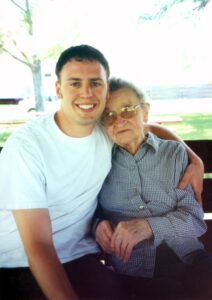 doesn’t cover. Long-term care benefits are running out, and you haven’t even started thinking about pitching in to cover your oldest child’s college tuition this semester.
doesn’t cover. Long-term care benefits are running out, and you haven’t even started thinking about pitching in to cover your oldest child’s college tuition this semester.
While this scenario doesn’t fit everyone, even when aging family members bring with them enough to support themselves financially, cash flow can be a constant exercise in strategy, paperwork and patience. Budgeting requires careful attention to expected and unexpected life events. Factor in time for forms and payments to be processed, and you could start feeling like a harried business owner who has never taken a business course.
Attention is valuable
From your youngest tugging at your pant leg to your mother calling you from the other room, it’s pretty obvious you are needed. It seems like dad always wants to talk just as the kids are coming through the door from school. Why is it that whenever you try to read to your mother, your kids start duking it out in the living room? Maybe it’s more like your college-age kid is blowing up your phone with texts while your father is asking you again about tomorrow’s plans, while your high-school-age child wants to know what’s for dinner.
The more you look around, the more you see that you being there for the ones you love is greatly valued. But how do you manage to give everyone what they need without burning yourself out?
You are n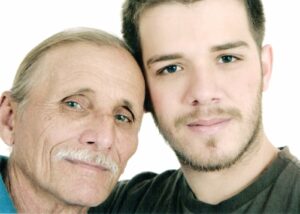 ot alone
ot alone
According to the Pew Research Center, “Nearly half (47%) of adults in their 40s and 50s have a parent age 65 or older and are either raising a young child or financially supporting a grown child (age 18 or older).”
And, “…nearly four-in-ten (38%) say both their grown children and their parents rely on them for emotional support.”
If you feel exhausted half the time, this could be the reason why. And while these challenges are common, they can lead to caregiving fatigue, especially if you don’t have enough support. That’s not a road you want to travel. If you feel you’re headed in that direction, be sure to reach out. Friends, family, doctors, local agencies and other organizations are there to help you find an extra pair of hands, ears and wheels when you most need them.
This post is sponsored by Home Instead Senior Care, serving Prince William and Fauquier counties.
Just as the weather breaks and it begins to grow warmer, the Women’s Health Center at Sentara Northern Virginia Medical Center’s team of doctors, nurses and staff are trading in their scrubs for tennis shoes.
It’s for the annual March of Dimes March for Babies walk.
“It’s such a great way for all of us to celebrate, honor, and remember our babies with others who care so much about mother/baby health issues,” explains Florence Pullo, Interim Director for the Women’s Health Center at Sentara Northern Virginia Medical Center, “Sentara actively participates in this campaign to emphasize how important we believe the health of mom and babies is and to unite the community in building a brighter future for all of us!”
It’s that dedication to teamwork and commitment to the smallest members of our community which is the cornerstone of everything that happens in the Women’s Health Center and is the foundation for Sentara Northern Virginia Medical Center’s partnership with Children’s National Health System.
Children’s National is ranked number one for newborn intensive care in the U.S. News & World Report 2017-18 Best Children’s Hospital Survey.
“This partnership is a good thing for families and the community,” says Dr. Ashraf Afifi, MD, MPH. “The team from Children’s National offers their skills in both the full-term nursery and the intensive care nursey.”
Children’s National’s Neonatologist Dr. Afifi is the Medical Director of Neonatology at Sentara Northern Virginia Medical Center. He was named a “top doc” in the recent “Best Of” edition of Northern Virginia Magazine. Since 2014, he has led the team, which staffs the special care nursery, a Level II Neonatal Intensive Care Unit (NICU), providing expert care for the sick newborns of Woodbridge and the surrounding region.
“Sentara was looking for the skills and expertise of Children’s National on the ground. Right now, we keep the kids who are in need of neonatal intensive services in Sentara. However, if infants need extra help and support, we’ll stabilize them and a transport team flies or ambulances them to Children’s,” explains Dr. Afifi.
The Children’s team at Sentara consists of full-time, board-certified neonatologists and neonatal nurse practitioners for around the clock care.
“We are here 24/7. Not all specialty nurseries have this level of care around the clock. We do,” explains Children’s National NICU Nurse Practitioner, Rosemary O’Neill.
The 14-bed unit typically consists of six intensive care and eight step-down beds. As a Level II NICU, Sentara Northern Virginia Medical Center is licensed to treat babies between 32 to 44 weeks of gestation and at least 1,500 grams or 3.3 pounds.
This partnership allows families to stay close to home as they deal with a premature baby.
“For our part, we want you to stay in the community, we have everything here. You don’t have to go elsewhere. We want to be full service for you. We’re trying to get the word out and inform more families because they’re not aware of those things,” explains O’Neill.
Last year there were 260 admissions to the intensive care nursery, which is reflective of how this collaborative approach has been effective and was needed by the community. Just over 15% of those babies were transferred to Children’s National for a higher level of care.
“This collaboration give families and caregivers more advanced technologies, more advanced diagnosis, more advanced devices,” says O’Neill. “Not only do we have access to Children’s National in D.C., but we also have access to all of Sentara’s resources to our south.”
Dr. Afifi agrees, citing the advancements in research and telemedicine.
“Super pediatric subspecialties, which are few and far between, we can now reach them by telemedicine. We can reach them from the comfort of the practitioner here at Sentara. For example, the peds pathology, endocrinology, cardiology –who will give the information and have the best advice.”
In the end, the partnership is a win for both the hospital and the community it serves.
“At the end of the day, you have a family caring for their child, they have their worries and anxieties for their child, will that child make it or not, how’s that child going to be, what will this child look like down the road in a year or two, having been born at 600 or 700 grams, all of this. Our team practicing here will definitely give them assurances and we can share all the numbers and statistics with them,” explains Dr. Afifi speaking to the team’s level of expertise.
It’s this commitment to the babies they serve and the families they get to know personally every day that motivates the team to participate in the March of Dimes walk. This year is no different as they’ll be part of the Sentara Northern Virginia Medical Center’s March for Babies team on Sunday, April 29 at the Loy E. Harris Pavilion in Manassas.
Join the Sentara team and register for this family and dog-friendly event.
In a previous article, we talked about ways to make local travel easier for the senior in your life. Sometimes, local travel means going to the doctor’s office. If you care for a senior who needs you to take them to see a doctor, you’ll need to be prepared. The general rules of planning a trip will probably still apply, but visiting the doctor requires some additional considerations. Here’s your to-do list.
Start the conversation – A few weeks before the appointment, when the senior in your care is relaxed and preferably talkative, ask how they have been feeling. Is there anything new bothering them? Do they have any questions? Listen closely and jot down notes in a health journal or notebook. Then list all medication and doses and how long they have been taking it. Document the day and time of the conversation.
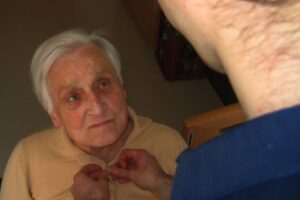 Continue the conversation – Two weeks before the appointment, have the same conversation you held in the weeks prior. Ask as many questions as you need to, but be sure to repeat the original questions you asked, too. One week before the appointment, repeat the process. Do the same one day before the appointment and the day of the appointment. Each time you do this, document the day and time of the conversation, as well as medication information. By the time you’re ready to meet the doctor, you will have four entries with useful data that could end up playing a critical role in your senior’s medical treatment.
Continue the conversation – Two weeks before the appointment, have the same conversation you held in the weeks prior. Ask as many questions as you need to, but be sure to repeat the original questions you asked, too. One week before the appointment, repeat the process. Do the same one day before the appointment and the day of the appointment. Each time you do this, document the day and time of the conversation, as well as medication information. By the time you’re ready to meet the doctor, you will have four entries with useful data that could end up playing a critical role in your senior’s medical treatment.
Keep “things” simple – If you’ve ever had to fumble through a large handbag full of cosmetics, medication, pieces of paper, stale chewing gum and free-roaming pennies, you know how frustrating it can be to find what you need, especially if you’re on the spot. Don’t let this happen to the senior in your care. Pack your senior a purse, wallet or bag with only the necessities, such as ID, insurance card, credit card, pen and the health notebook. Make these items easily identifiable and accessible. Everything else can stay in a different bag.
Let your senior lead – Often the most difficult part of having a caregiver is that it brings on feelings of dependence and vulnerability. Couple this with the natural anxiety many of us feel at the doctor’s office and you can understand why it’s so important to let the senior in your care do as much as they can for themselves. If possible, let your senior enter the office first. Have them sign in for themselves. Since a bag or wallet has been packed in a friendly way, it should be easier for your senior to take out their health insurance card and ID and hand it to the receptionist. Have them choose the seats in the waiting room. All of this will help empower your senior.
Be the interpreter – Medical terminology can sound like a foreign language. Watch your senior’s facial expressions and body language when the doctor is speaking. If your senior appears confused, zoned out, anxious or agitated, ask the doctor to slow down and explain. Repeat back what the doctor says and ask your senior if they understand. Encourage them to ask questions about diagnosis, prognosis and treatment, and discuss the information in the health notebook. Help your senior find words if they are struggling to remember them. Throughout all this, take notes so you can remind your senior (and yourself) of the conversation later.
them to ask questions about diagnosis, prognosis and treatment, and discuss the information in the health notebook. Help your senior find words if they are struggling to remember them. Throughout all this, take notes so you can remind your senior (and yourself) of the conversation later.
Decompress – Depending on the reason for and duration of the appointment, your senior could feel exhausted after. They might also be experiencing other emotions, such as sadness, anxiety or anger. Once you leave the appointment, it’s important to let the senior in your care talk. Be sure to recap what happened and touch on the next steps. However, it’s important to then move on to a topic and/or activity that is less stressful. Think of something both of you find relaxing and enjoy doing it together.
As with anything else in caregiving, don’t try to go it alone. Seek the support you need to better care for the senior who needs you. Your senior and you will both be happier – and healthier – because of it.
This post is sponsored by Home Instead Senior Care, serving Prince William and Fauquier counties.
We know what it’s like to live in this area. Between the busyness of everyday living, the demands continuously made of us and the traffic, it’s enough to try the sanity of even the most level-headed among us. So imagine what it’s like for the senior in your life who has to travel locally with you. Not only can they feel your stress, they have their own issues to manage.
We’ve worked with families enough to know that no one wants tempers to flare or plans to be disrupted, especially over something that could have been avoided by implementing some simple strategies. Because we understand how easy it is to get derailed by even the little things, we’ve put together these tips and reminders to help make traveling locally with your senior as smooth and painless as possible. Let’s get started.
 One week or more before the trip – Yes, prep starts this early. It begins by being judicious about setting appointments or scheduling errands. Based on the needs of the senior in your care, book appointments and activities in segments that are reasonable. Don’t try to cram multiple appointments in on the same day if you don’t have to. And avoid running from one side of town to another if you can group your errands geographically. If you don’t plan this part wisely, the whole local travel experience can quickly become a tiresome exercise in frustration that rarely ends well.
One week or more before the trip – Yes, prep starts this early. It begins by being judicious about setting appointments or scheduling errands. Based on the needs of the senior in your care, book appointments and activities in segments that are reasonable. Don’t try to cram multiple appointments in on the same day if you don’t have to. And avoid running from one side of town to another if you can group your errands geographically. If you don’t plan this part wisely, the whole local travel experience can quickly become a tiresome exercise in frustration that rarely ends well.
48 to 12 hours before the trip – This is probably going to be mostly a period of observation. Pay attention to how the senior in your care is feeling emotionally and physically. If they have been having specific challenges close to the scheduled local travel, you’ll want to judge whether or not the plans you’ve made still make sense. Address any issues as soon as possible. Even if all is well, during this period you’ll want to remind your senior about the plans you’ve made together. It’s good to jog the memory as often as needed, and doing so can give the senior in your care something to look forward to.
Four to three hours before the trip – Depending on the needs of the senior in your care, you will need to allow plenty of time for getting ready. Choosing clothing, then bathing, dressing, eating, and discussing plans again, can be time consuming. Decrease stress by allowing enough time to get everything done at a comfortable pace. 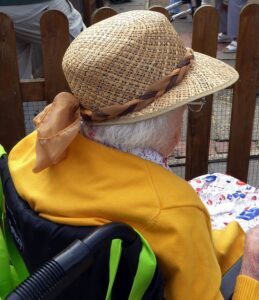
Two hours before the trip – This is a good time for the senior in your care to relax a little while you do things like ready yourself and gather necessary items for the excursion. Veteran caregivers keep a physical or mental list of must-have items for the drive. These can include medical equipment, medication, snacks, books, checkbooks, credit cards, phones, extra clothing and sanitary items. Make sure you have enough of everything. You don’t want to run out of necessities like oxygen or blood sugar testing strips before you return home.
One hour before the trip – Remind the senior in your care that you are getting ready to leave. Take care of any last minute toileting or hygiene. Don’t expect to be able to rush out the door and jump into the car. Give yourself plenty of time to address any mobility issues. This is also a good time to reassess your senior’s mood. Some seniors become anxious as it gets closer to leaving the home where they know they have everything they need. Remind them you’ve planned and packed, and review with them what you have on hand. If your senior reminds you of something you’ve overlooked, be grateful they told you before you walked out the door!
In the car – Help the  senior in your care into the vehicle. Make them comfortable and assist with the seatbelt, double checking to ensure it is fastened correctly. Play soothing music or enjoy a light conversation. Drive safely. And don’t be surprised if you need to stop prior to reaching your destination. If you’ve planned ahead, you know this is a possibility, and you’ll have plenty of time to take care of those emergency bathroom breaks.
senior in your care into the vehicle. Make them comfortable and assist with the seatbelt, double checking to ensure it is fastened correctly. Play soothing music or enjoy a light conversation. Drive safely. And don’t be surprised if you need to stop prior to reaching your destination. If you’ve planned ahead, you know this is a possibility, and you’ll have plenty of time to take care of those emergency bathroom breaks.
Upon arrival – Arrange everything so that when you help the senior in your care out of the vehicle, you don’t have to leave them standing unassisted while you rush around and gather the items you’ve packed. If this means they have to sit in the car for a few moments while you prepare, that’s fine. Better to have everything organized so you’ll have free hands to help out your fellow traveler.
When you look at this list, you might say, wow. That’s an awful lot of preparation just to run a few errands or make it to an appointment. If that’s what you’re thinking, you’re right. Traveling with seniors requires more work and strategy than many younger people are accustomed to. The good news is, the more you do it, the easier it gets, and the more enjoyable your time spent together becomes. It’s these little local adventures that can mean a lot to the senior in your life. And that makes the effort well worth it.
This post is sponsored by Home Instead Senior Care serving Prince William and Fauquier counties.
Emergency Department physician Dr. Anoop Kumar has dedicated his life to helping people who are sick, scared and hurt.
“I received my MD in 2007 and completed my training in Emergency Medicine in 2011. I like the clinical diversity of Emergency Medicine. I see young, old, female, male, many critically ill, some not so ill, medical, psychiatric, surgical, and social conditions. If one can bear to look, it’s [the Emergency Department] a window into the soul of society,” says Dr. Kumar.
While his goal is to help and heal the men, women, and children who enter through the doors of Sentara Northern Virginia Medical Center, Dr. Kumar has always been concerned with more than physical ailments, saying, “The mind-body connection is real. There’s a lot of research pointing to that.”
That connection plays an integral part in his life, and it’s something he’s especially mindful of as he’s treating some of the region’s sickest patients. While being the answer to a patients’ prayers is a tremendous gift, it also carries with it an enormous amount of responsibility. That’s why Dr. Kumar has organized something for his co-workers at Sentara Northern Virginia Medical Center. Every month, he leads a meditation session for the doctors, nurses and staff at the hospital.
Meditation is something he has had in his life since he was a child. “I grew up with meditation,” explains Dr. Kumar. “To start off meditating as a kid isn’t really meditating, it’s just noticing things around you. Noticing your thoughts, noticing your feelings.”
As a child, Anoop Kumar was surrounded by the teachings of Eastern philosophy. He says he came to recognize a common message woven through philosophy, science and spirituality- a message of well-being. It’s that message that helped inspire him to write his first book, “Michelangelo’s Medicine.”
“When I became a physician and completed my training in Emergency Medicine, I saw that all those years of thinking about health, healing and what it means to be human could lend an important context to healthcare,” he explains. “One of the main points I make in the book is the human being is not only a human body. For example, when we learn anatomy, we learn about organs. But organs alone don’t make a human being. We have to include other elements, like emotion, thought, intuition, desire and consciousness.”
Dr. Kumar isn’t a stranger to sharing his knowledge when it comes to the art of meditation. It was just about two years ago when he began corresponding with Deepak Chopra, known worldwide as a pioneer in mind-body medicine. “The statements he made about the mind several decades ago were often ridiculed, but today some of those same principles are taught in top institutions around the world. Interestingly, the period over which his career developed is the same period over which I was privately thinking about the same things.”
Since that time, Dr. Kumar has spoken at three of Chopra’s events. He says it’s been an invaluable experience, and while he’s gleaned a number of lessons from these events, one of the most important is simple: “I’ve learned to keep putting my ideas out there. There are no perfect ideas. If the ideas are good, they become refined and therefore more useful in the heat of the spotlight.”
Dr. Kumar’s latest idea is coming in the shape of a book on anxiety and how poorly managed anxiety and stress contributes to disease. In an effort to keep his healthcare colleagues from heading down that path, Dr. Kumar says he’ll continue offering his month meditation, which he hopes offers not only relief but empowerment to members of the team.
“There’s always a lot more to know, there’s always a lot more to experience,” he says. “And sometimes as we branch out and experience more things, the things that we already know get seen in a new context and new light and changes how we experience our lives.”
If you’re looking for a change or an employer who supports you, head over to sentaracareers.com. We’re looking for qualified candidates to join the team.
In our last article, we talked about four activities you can enjoy with the senior in your life to increase quality of life. We started off with conversation, sketching, reciting and singing. Here are four more ideas to try.
Stretching – If you have been caring for a senior for a while, chances are you know a little about their physical strengths and challenges. Put this knowledge to good use. Lead a little stretching session. You might be able to do whole body stretches (reach high up over the head, point palms to ceiling and gently wiggle the fingers) or focus on a particular body part, like the foot. Point the toes, flex the ankle, whatever feels good. Be sure to go slowly and ask your senior how each movement feels. The point is to loosen the muscles and to engage in conversation about sensations. Note, it is recommended you ask a physical therapist or doctor what kind of movements they would recommend before you engage in this activity.
 Gift making – Giving makes most people feel good, and giving handmade gifts can feel even better. Help the senior in your life enjoy both. Put together some simple gifts for birthdays, holidays or just because. You might help your senior arrange items in a gift basket, wrap it and put a big bow on it. Or you could try creating a centerpiece using a candle, silk flowers and a plate. For some people, just wrapping a gift and tying a nice ribbon is enou
Gift making – Giving makes most people feel good, and giving handmade gifts can feel even better. Help the senior in your life enjoy both. Put together some simple gifts for birthdays, holidays or just because. You might help your senior arrange items in a gift basket, wrap it and put a big bow on it. Or you could try creating a centerpiece using a candle, silk flowers and a plate. For some people, just wrapping a gift and tying a nice ribbon is enou gh. No matter what you choose, this activity is good for maintaining motor skills, and it can stimulate different kinds of conversation.
gh. No matter what you choose, this activity is good for maintaining motor skills, and it can stimulate different kinds of conversation.
Cooking – For many seniors, cooking is a challenge. Manipulating utensils can be painful or awkward. Forgetting how to prepare food or operate the oven is often a problem, too. Let the senior in your life be part of the process by simplifying it. For example, take all the ingredients out for a sandwich and have your senior assemble it. Prepping for a party? Maybe your senior can dip strawberries in chocolate and set them up to dry. Maybe chopping carrots is too much, but peeling is fine. Whatever the case, safely involve your senior in short stints in the kitchen to increase their sense of independence as they use smaller muscle groups.
Sensory games – Humans are grounded through the senses, and what we experience through them leaves a lasting impression. There are all sorts of ways you can use the senses to evoke memories, feelings and expression. Play an old album and talk about the time period the music reminds your senior of. Lightly spray some of their favorite perfume or cologne in the air and ask them what they like or remember about the smell. If your senior is an animal lover, arrange a short visit with a gentle dog, cat or therapy animal and encourage petting. Offer different foods for the senior in your care to sample. Listen to and watch reactions closely. All these short activities involving the senses can encourage word recall, stimulate conversation and provide enjoyment.
As we noted in our previous article, not all activities will be appropriate for all people. Consider what you know about the senior in your life and offer alternatives based on that. The more activities you do together, the more you will learn about their likes and dislikes and you will be able to offer more options. You’ll see that short bursts of activity can go a long way towards improving quality of life.
This post is sponsored by Home Instead Senior Care serving Prince William and Fauquier counties.

